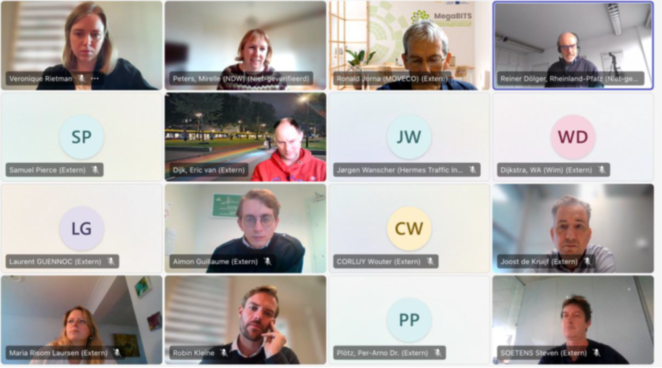On November 12, the MegaBITS Advisory Group met virtually, with five members presenting their projects related to Intelligent Transport Systems. The goal was to share knowledge and explore the latest cycling technologies in development. Below is a brief description of these initiatives. The full presentations can be found at the end of this article.

BIKE project
Jørgen Wanscher, CTO and Co-founder of Hermes Traffic Intelligence, presented the BIKE (Bicycle, Insight, Knowledge, and Evaluation) ecosystem. Labelled as “A privacy compliant collaborative revenue sharing eco-system for floating bicycle data meant to bridge the gap between suppliers and cities for cycling data”, the BIKE ecosystem will make it easier for suppliers and cities to exchange cycling data. The BIKE ecosystem has been supported by ESA via a feasibility study.
The project can bring knowhow, outreach and potential funding, but requires committed stakeholders in order for the ecosystem to develop and scale.
ShareDiMobiHub project
Eric van Dijk, Policy Advisor for the Province of Utrecht, presented ShareDiMobiHub, which focuses on the practical implementation of mobility hubs linked with public transport at metropolitan regional scales.
The project aims to upscale shared mobility initiatives to a regional level. This process will take place in Amsterdam region, Vestfold region and Leuven. The knowledge acquired will then be adopted in other regions or cities.
The results of ShareDiMobiHub, expected by September 2025, include a learning platform, which is currently under development. A Symposium is also planned for the third week of September.
Cooperation with Open Street Map
Reiner Dölger from the Rheinland-Pfalz Ministry for Transport detailed efforts to enhance cycling network data through collaboration with public authorities and OpenStreetMap (OSM). In Rheinland-Pfalz, this data supports routing, public transport, tourism, and more. While state and municipal data exist, they fall short of meeting all needs.
To address this, Rheinland-Pfalz explored using OSM as a data source, organizing an Interreg Peer Review to examine challenges. Combining administrative data with OSM emerged as the most effective solution. Local communities can upload data to OSM, making it accessible to other providers while avoiding legal issues.
A pilot initiative in Trier aims to publish data in an OSM-compatible format.
NAPCORE work on cycling data standardization
Mirelle Peters, Community Manager at the National Access Point for Mobility Data in the Netherlands, highlighted the need to harmonize standards for cycling data and adapt the standards to use cases.
The actions taken by NAPCORE include strengthening partnerships with stakeholders in the cycling and urban mobility areas, including POLIS, CIE, ITxPT, TN-ITS, the European Parking Association (EPA) and others. Workshops have been carried out to define use cases and technical requirements for data sets related to infrastructure, real-time data and parking.
A final workshop will be held on counting data at the beginning of December.
Dutch Metropolitan Innovations(DMI)-ecosystem
Joost de Kruijf, Director of Dutch Cycling Intelligence, explained that policymakers normally use three interventions in cycle policies: strengthening the network, improving parking facilities and stimulating bike use. However, the measurement of the effects of these three interventions is not investigated.
The cycling policy ecosystem and digital mobility data ecosystem are normally not connected to each other. DMI is targeted at bridging both worlds: identifying what data is there, where can it be found, how to visualize it and what activation perspective it provides. An example of collaboration from the DMI is the tendering of the cycling app by five Dutch provinces.
To learn about each of these presentations, download the Advisory Group Members’ slides here:
